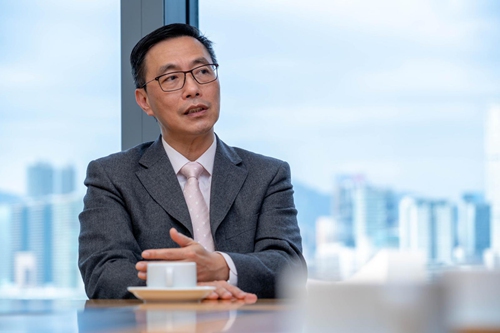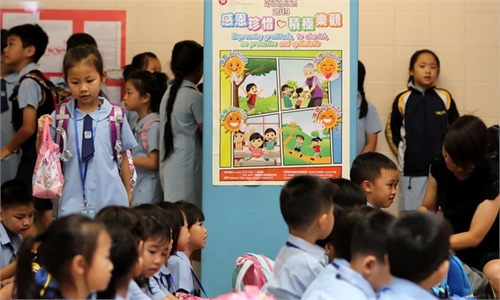HK schools to enhance understanding of mainland through programs

Hong Kong Secretary for Education Kevin Yeung Yun-hung.
In line with the implementation of the national security law for Hong Kong, the city's education authority plans to integrate national security-related content into different courses and to roll out various activities, increasing exchange opportunities for Hong Kong students to enhance their understanding of the mainland.
The city's education authority is discussing with curriculum experts to integrate knowledge related to national security into various subjects of the school curriculum, said Hong Kong Secretary for Education Kevin Yeung Yun-hung said in an exclusive interview with the Global Times on Wednesday.
Yeung said that they have set up new courses, scheduled to start in September, to teach students in low and middle grades more history about what has happened after the establishment of the People's Republic of China in 1949.
This move aims to push forward Hong Kong students' recognition of the country, Yeung told the Global Times, adding that there are plans to increase opportunities for student exchanges to the mainland.
Last week, China's first juvenile education base for the Constitution and Basic Law of the Hong Kong and Macao Special Administrative Regions (SARs) was set up in Shenzhen, South China's Guangdong Province, the Xinhua News Agency reported.
The base was jointly established by Shenzhen University's Center for the Basic Law of Hong Kong and Macao SARs and the Shenzhen Overseas Friendship Association.
Yeung said that they are seeking to expand activities for Hong Kong students to communicate with students in different cities in the mainland.
"I truly feel that by visiting the mainland, and getting to know our country better, they [Hong Kong students] will be able to establish a bond with our country. Slowly, the students will develop an attachment that we belong to the same family," he noted.
The Hong Kong education bureau will study how to help students better understand the significance of the law, its key contents, and the influence on young people after the legislation becomes effective, Yeung said in late June.
The education authority is seeking to reform Hong Kong's liberal studies, as there are debates over reform of this subject, he said.
An expert team is discussing this topic, and Yeung himself will review a report after September when they will make a plan based on the report and considering different opinions.
Hong Kong's liberal studies and relevant textbooks were in the spotlight during the riots, as many of those books were found to beautify violence, riots and smeared the "one country, two systems" principal.
The education secretary also mentioned that many students were deeply influenced by the social turmoil in the past year.
Hong Kong police made 8,981 arrests between June 9, 2019 and May 29, 2020 in connection with the protests. Among those arrested, 1,707 were under 18, including 1,602 secondary students and eight primary school pupils, the South China Morning Post reported.
When asked if separatism and secessionism is deeply rooted in Hong Kong students' mind, Yeung said he believes the students were used by certain political figures. "They were blurred by certain things, which makes it hard for them to distinguish what is right and what is wrong," he said.
The implementation of the national security law has secured a tranquil time in Hong Kong to reflect and discuss certain issues, and what went wrong in the past. He said relying only on education is not enough. The whole society, including parents, should work together to impart the right sense of values for students.
According to Yeung, now authorities require schools to establish systems to deal with political activities. The education authority also specifically informed schools what kinds of activities are banned from schools and teachers are required to deliver the message to students and their parents.
Attaching great importance to students who were arrested during the riots, Yeung said that apart from making plans for every one of them, the authority also plans to hire professionals, such as psychologists and behavioral experts, to convince them to stop their wrong behaviors.
"Hopefully we will help them establish the right sense of values… and most importantly, plant a sense of nationhood in their heads," said Yeung.


